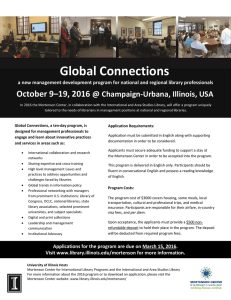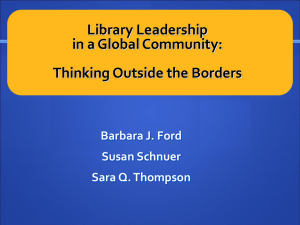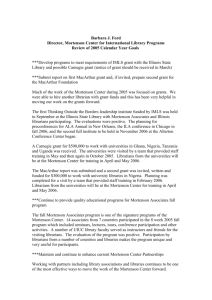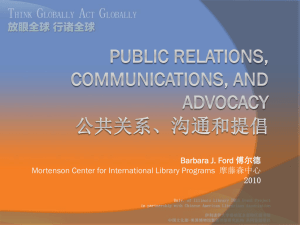Building Global Library Leaders: An Evaluation of the Mortenson Center
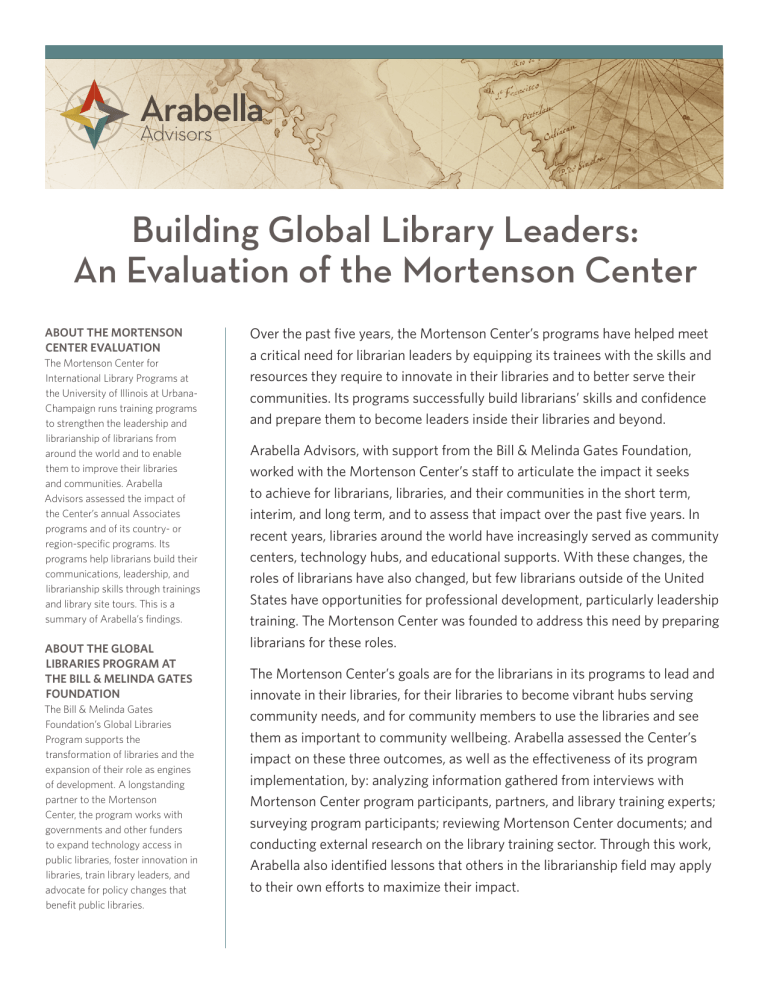
ABOUT THE MORTENSON
CENTER EVALUATION
The Mortenson Center for
International Library Programs at the University of Illinois at Urbana-
Champaign runs training programs to strengthen the leadership and librarianship of librarians from around the world and to enable them to improve their libraries and communities. Arabella
Advisors assessed the impact of the Center’s annual Associates programs and of its country- or region-specific programs. Its programs help librarians build their communications, leadership, and librarianship skills through trainings and library site tours. This is a summary of Arabella’s findings.
ABOUT THE GLOBAL
LIBRARIES PROGRAM AT
THE BILL & MELINDA GATES
FOUNDATION
The Bill & Melinda Gates
Foundation’s Global Libraries
Program supports the transformation of libraries and the expansion of their role as engines of development. A longstanding partner to the Mortenson
Center, the program works with governments and other funders to expand technology access in public libraries, foster innovation in libraries, train library leaders, and advocate for policy changes that benefit public libraries.
Building Global Library Leaders:
An Evaluation of the Mortenson Center
Over the past five years, the Mortenson Center’s programs have helped meet a critical need for librarian leaders by equipping its trainees with the skills and resources they require to innovate in their libraries and to better serve their communities. Its programs successfully build librarians’ skills and confidence and prepare them to become leaders inside their libraries and beyond.
Arabella Advisors, with support from the Bill & Melinda Gates Foundation, worked with the Mortenson Center’s staff to articulate the impact it seeks to achieve for librarians, libraries, and their communities in the short term, interim, and long term, and to assess that impact over the past five years. In recent years, libraries around the world have increasingly served as community centers, technology hubs, and educational supports. With these changes, the roles of librarians have also changed, but few librarians outside of the United
States have opportunities for professional development, particularly leadership training. The Mortenson Center was founded to address this need by preparing librarians for these roles.
The Mortenson Center’s goals are for the librarians in its programs to lead and innovate in their libraries, for their libraries to become vibrant hubs serving community needs, and for community members to use the libraries and see them as important to community wellbeing. Arabella assessed the Center’s impact on these three outcomes, as well as the effectiveness of its program implementation, by: analyzing information gathered from interviews with
Mortenson Center program participants, partners, and library training experts; surveying program participants; reviewing Mortenson Center documents; and conducting external research on the library training sector. Through this work,
Arabella also identified lessons that others in the librarianship field may apply to their own efforts to maximize their impact.
Key Findings from Arabella’s Evaluation
The Mortenson Center’s programs are highly effective, and the Center is largely achieving its desired outcomes. It has direct influence and clear impact on librarians, with whom it works directly. It also contributes to changes in libraries and communities, although data collection and attribution are more difficult at these levels.
• Impact on Librarians: The Mortenson Center has enhanced librarians’ skills, knowledge, and confidence, positioned them as resources for their colleagues, expanded their professional networks, and prepared them for leadership opportunities.
• Impact on Libraries: Most of the Center’s librarian participants applied the skills and confidence they built during training in their libraries, introducing new programs and a greater focus on customer service.
• Impact on Communities: Mortenson Center training has shifted librarians’ attitudes about their role in their communities and encouraged them to adopt a more user-driven approach to their work.
• Factors Contributing to Impact: The Mortenson
Center’s experienced staff provides relevant, practical, culturally-competent trainings that fill an unmet need for librarian leadership training. Together these factors contribute to participants’ satisfaction, as well as to the Center’s strong reputation and impact.
What We Learned about the Mortenson Center
The Mortenson Center has trained over 1,000 innovative library leaders since it was founded in 1991. Training participants we surveyed and interviewed indicated that:
• The Mortenson Center is prestigious and seen as a model for librarianship training throughout the world.
In fact, experts, partners, and participants alike consider the Mortenson Center to be a top program for global librarianship training. Remarkably, 100 percent of participants Arabella Advisors surveyed were either “satisfied” or “very satisfied” with the Mortenson Center’s programs.
• Mortenson Center alumni are creating their own impact. Eighty percent of survey respondents felt more prepared to take on leadership roles or additional responsibility in their libraries thanks to their training at the Mortenson Center, and one-third of participants went on to take such leadership roles in professional networks.
• Mortensen Center alumni are putting innovation into practice. More than 70 percent introduce a new tool, service, or resource in their library within five years of training.
• Libraries and communities around the world are seeing the impact of the Mortenson Center’s work.
Seventy-nine percent of participants say that, since applying the lessons they learned at the Mortenson
Center, their library is more prepared to serve users’ needs, and 76 percent say that their colleagues are more prepared to serve users’ needs.
About Arabella Advisors
Arabella Advisors helps philanthropists and investors find innovative ways to maximize the impact of their resources.
Our team provides research, strategies, and management to help clients make a difference in the issues that matter most to them.
For more information, contact us at info@arabellaadvisors.com.
www.arabellaadvisors.com
DC • Chicago • New York • San Francisco
2
THE MORTENSON CENTER’S IMPACT
ON LIBRARIANS, LIBRARIES, AND
COMMUNITIES
The Mortenson Center is a highly effective leadership training program for global library professionals, one that is well respected by its participants, partners, and experts in the field. It imparts the key skills and confidence librarians need to lead modern libraries and to meet the needs of their communities. Research shows that the
Center is meeting a critical, unmet need for leadership training among librarians from outside the United States.
Moreover, it is meeting this need effectively: 100 percent of its participants were satisfied with their training, and
98 percent would recommend it to a colleague.
The Center’s impact—and its strong reputation among participants and peers—would not have been possible without its experienced staff and collaborative, culturally responsive approach. The Mortenson Center’s staff are adaptable, skilled trainers with extensive networks among top library organizations. Further, they are deeply committed to their trainees’ professional development and work with trainees and in-country partners collaboratively to design relevant and culturallyappropriate trainings.
The Center’s
Impact on
Librarians
Over the past five years, the Mortenson
Center has succeeded in equipping librarians to lead and innovate in their libraries by providing relevant, high-quality trainings
“The Mortenson Center didn’t just develop the academic side of my professional life, but also the personal skills that I use in very practical ways to enlarge my communications styles, library information skills, [and I have since been] nominated to be in a leadership position.”
—2008 Fall Associates
Program Participant and by exposing librarians to best practices in librarianship. Specifically,
Mortenson Center programs have impacted library leaders in four key ways: by enhancing their librarianship skills and knowledge, by positioning them as resources to their colleagues, by expandeding their professional networks, and by preparing them for leadership opportunities. The
Center has been most effective at achieving its desired outcomes for individual librarians.
Enhanced Skills, Knowledge, and Confidence Mortenson
Center alumni report that the trainings enhanced their librarianship skills and their confidence as emerging leaders, enabling them to more effectively communicate
77%
IMPROVED SKILLS BY TYPE OF MORTENSON CENTER PROGRAM
89%
87%
79%
84% 84%
78%
73%
50%
32%
Associates Country/
Region
Communications
Associates Country/
Region
Management
Associates Country/
Region
Technology
Associates Country/
Region
Advocacy
Associates Country/
Region
Fundraising
3
with their colleagues and improve their leadership and management styles. Our survey showed that the
Mortenson Center improved participants’ skills in the five main focus areas of its programs: communications, management, new technologies, library advocacy, and fundraising. These findings were supported by findings from in-depth interviews with past participants, who pointed most especially to gains in communications and management skills—skills that are essential to librarians’ day-to-day work.
In addition to these skills gains, training sessions and library visits exposed Mortenson Center participants to new ideas and best practices for effectively managing their libraries and proactively responding to patrons’ needs.
These ideas and best practices spurred over 70 percent of participants to make changes in their libraries.
Both survey and interview data also indicate that, along with building skills and knowledge, many participants felt more confident in their leadership abilities, were motivated to be more ambitious with their career goals, and viewed themselves as change makers in their libraries as a result of attending a Mortenson Center program.
Expanded Professional Networks The Mortenson Center trainings also introduced participants to an international network of ambitious, dedicated leaders who continue
“With my background in
Mortenson Center, I can see something bigger….I can take on more senior positions in the library. I am 100 percent sure after this experience that I need to look for something bigger in my career. I was first in a box, and now I’ve seen the world.” to serve as mentors and resources to one another. Indeed, aside from the program’s content and prestige, one of the primary reasons librarians participated in a
—2013 Associate
Mortenson Center program was to meet other librarians and leaders in the library sector. These relationships foster sharing of resources and best practices and mutual support among alumni as they pursue their professional development goals. While building relationships with other library professionals in the Mortenson Center network is valuable, research shows that, for many participants, the Center’s more meaningful impact has been to motivate them to more deeply engage in their local library networks. According to the survey, over half of respondents became more involved in library professional networks and associations after their trainings, and onethird took on a leadership role in a professional network.
Many other participants presented at conferences or in their library associations, an indication that they are seen as knowledgeable leaders.
Preparation for Leadership Opportunities The Mortenson
Center has empowered librarians to take on additional responsibilities and act as leaders in their libraries and communities. Eight in ten respondents felt more prepared to take on leadership roles or additional responsibility in their libraries thanks to their training, and more than 20 percent of participants received a promotion within five years of their training. Even in cases where opportunities for advancement did not exist, participants have grown as leaders and library professionals. In fact, most participants in Mortenson Center programs have demonstrated their leadership by heading new initiatives or implementing changes in their libraries in their current positions.
Lessons for the Library Sector
Confidence matters: Skills-based training and affiliation with an international cohort of peers helps build the confidence participants need in order to take on leadership roles when they return home.
Show, don’t tell: Exposing librarians to new models provides them with examples of successful implementation to emulate and inspires them to innovate and make change at home.
Look to networks for leadership opportunities: When opportunities for advancement within individual libraries are limited, local or regional library networks can offer librarians a venue to exercise their leadership skills as well as to share knowledge and other resources.
The Center’s Impact on Libraries
Mortenson Center-trained leaders have helped their libraries become more vibrant places that evolve to meet community needs. As a result of Center training, participants have expanded library programs and services, introduced new technologies, helped prioritize a customer-service approach, and shared best practices gleaned from Center trainings with colleagues.
Expanded Services Since their Mortenson Center trainings, most participants’ libraries have offered new services based on successful models participants learned
4
during training and on library users’ needs. More than 70 percent of participants who have had at least a year to implement what they learned at the Center have led an effort to introduce a new tool, service, or resource in their library. Technology was a central component and enabling tool for many of their changes. New services include both programs to help libraries better serve users, such as new programs and spaces to engage young people, and programs to help librarians better manage libraries, such as new systems for tracking collections.
“[After I conducted a training on] customer care…the library’s focus shifted to personal customer care and our customer satisfaction survey shows an improvement in our service of 96 percent.”
Enhanced Customer-
Service Orientation
Research suggests that, after Mortenson
Center training, both participants and their libraries adopt a more —2012 Associates
Program Participant customer-oriented attitude. Fully 90 percent of participants say that input or requests from library patrons are influential or very influential in how they make decisions about programming and resource allocation at their libraries. In fact, user input is the most influential factor assessed, followed closely by availability of technology. Further, the data show that libraries are better able to meet users’ needs after a staff member participates in a Mortenson Center training: 79 percent of participants say that, since applying the lessons they learned at the Mortenson Center, their library is more prepared to serve users’ needs, and 76 percent say that their colleagues are more prepared to serve users’ needs.
Trained Staff After participating in Mortenson Center trainings, alumni often shared best practices and materials from their training with their colleagues. They used a variety of means, ranging from formal presentations at conferences to smaller workshops with local staff to informal sharing with colleagues and local networks.
On average, participants shared lessons learned with
40 of their colleagues. Data on the impact of the “ripple effect”—the extent to which these trainings have resulted in improved skills or tangible behavior change among colleagues—is inconclusive, as this was not a main focus of our evaluation. That said, evidence from this evaluation suggests that a significant result of these trainings is that alumni themselves are positioned as knowledgeable leaders. For example, one participant from the 2008
Fall Africa Group led a seminar for all staff in his library, which exposed his colleagues to the management and technology resources he shared even as it positioned him as the library’s go-to resource for new technologies.
Lessons for the Library Sector
Book site visits and virtual tours: Exposure to new models can help make librarians more aware of how to effectively meet user needs.
Teach trainees to share: Devoting time to training participants on how to effectively relay quality knowledge to their colleagues and networks increases the scale of the training’s impact.
Get to them early: Opportunities, small grants, or awards to make improvements in their libraries—especially for early-career librarians—will help position these librarians to become leaders at home in the near term.
The Center’s Impact on Communities
The Mortenson Center has successfully shifted librarians’ attitudes about their role in the community, inspired them to adopt a more user-driven approach to their work, and developed their leadership potential to serve their libraries and communities. While the Center’s influence on communities is less direct, our evaluation demonstrated that the Mortenson Center has made strides in changing how participants interact with their communities. Specifically, it has prepared participants to build partnerships and inspired them to increase their community outreach, which in some cases has increased community members’ awareness of library resources and services. The Mortenson Center also strives to change community members’ attitudes toward and use of their libraries, though assessing such attitudes and usage was was not a focus of our evaluation and so is not a subject we will comment on extensively.
Increased Partnerships with Community Organizations
Based on what they learned at the Mortenson Center, some participants successfully built new partnerships in their communities that led to increased community awareness of library offerings as well as expansion of services to reach new audiences. Prior to the trainings, many participants did not actively build partnerships in their communities; they did not see this as their role, nor did they have models of how these partnerships could function effectively and benefit their libraries. As a result
5
of the library models to which they were exposed and the core skills they learned, especially approaches to communications and advocacy, participants were better prepared to engage with local organizations or community groups. For example, a 2011 Romanian Program participant partnered with a local nongovernmental organization to run a library program geared toward youth and young adults. In addition, 54 percent of survey respondents received invitations from community groups or leaders to speak or provide input, an indication that these librarians are enjoying increased status in their communities.
Enhanced Customer Service and Increased Community
Outreach As a result of the lessons they learned at the
Center, many participants were inspired to assess users’ needs and increase their outreach in their communities, which in some cases led to increased community use of the library. According to one participant, most library professionals in her country “still see librarians as bookkeepers, not as having vital roles in the community,” but Mortenson Center participants have begun to see themselves as leaders. They adopt a more customer service-oriented approach to their work and conduct more community outreach. Further, survey data indicate that
52 percent of respondents agreed that more people are using their libraries, and 44 percent agreed that community members more frequently hold meetings or events at their libraries.
Increased Community Awareness of Library Services
As a result of their enhanced customer service approach and increased community outreach, participants report that community members are now more aware of library services. In some cases, this increased awareness may have led to increased library usage.
Lessons for the
Library Sector
“The users are more aware of the services they have and are more likely to approach librarians for assistance. [Librarians] are more proactive. We take the library to them. We don’t wait for them to come to the library.”
Put the customer first:
Prioritizing userdriven programming
—2010 Tech Training
Program Participant pushes librarians to do deeper, more regular outreach to community members, which in turn helps build greater connections between the library and the community it serves.
Partner for progress: No library can do it all; encouraging librarians to find partners with more expertise in working with new customer groups can help them expand their library’s services.
Conclusion
Experts, partners, and participants alike respect and value the Mortenson Center. As one expert put it, “the
Mortenson Center is the premier program for global librarianship training”. Thanks to its skilled staff and collaborative approach, the Center has successfully built librarians’ skills and confidence, expanded their professional networks, and positioned them as leaders.
It has also given librarians the tools they need to offer new services in their libraries and to deepen their connectedness to their communities. The Mortenson
Center’s international programs connect its home university to library leaders around the globe and serve as a model across the library sector.
COMMUNITY ENGAGEMENT AS A RESULT OF PARTICIPANTS
APPLYING WHAT THEY LEARNED AT THE MORTENSON CENTER
Community members are more aware of library resources
More community members view the library as best place to use new resources/technology
More community members request new programs or resources at the library
More community members are advocates for the library and its services
More people are using the library
Community members hold meetings or events at the library more frequently
53%
44%
52%
72%
66%
62%
6
APPENDIX: EVALUATION DESIGN PROCESS
Before conducting an evaluation of the Mortenson
Center’s impact, Arabella Advisors, with support from the
Bill & Melinda Gates Foundation, worked closely with the
Center over six months to articulate its desired outcomes, develop a theory of change, and draft indicators. The process of defining the Center’s goals and explaining how its programs contribute to those goals was critical. These planning efforts provided the underlying structure for the eventual evaluation and gave the staff a platform from which to consider what they hoped to learn and how they planned to use the resulting data. This framework will also serve the Center in future evaluation, strategic and program planning, and communications efforts.
programs, and activities and its intended outcomes or impact. It includes the assumptions guiding program design, as well as the goals the organization seeks to achieve through those programs.
The first step in developing the Mortenson Center’s theory of change was to define its programs and desired outcomes. We started by describing what the Center does. Arabella reviewed the Center’s program and internal documents and interviewed the staff to catalogue each of its core strategies and activities. The next step was to understand why the Center does what it does. Through an iterative, facilitated process, we articulated the Center’s desired outcomes, asking questions such as:
Evaluation planning was a learning process for the
Mortenson Center, and following a similar process can help other organizations in the library sector and beyond work more strategically. To that end, this section outlines the basic process that Arabella Advisors followed with the Mortenson Center to develop its theory of change and prepare for its evaluation.
Identifying desired outcomes and developing a theory of change
A theory of change is a visual representation of the relationships between an organization’s strategies,
• What is success for the Mortenson Center in the short term? What is success in the long term?
• What is the context in which the Center works? What factors support or inhibit the Center’s success?
• Who does the Center work with and who benefits from its programs?
• How do the Center’s programs benefit those target audiences? What is different for them personally and/or professionally because of Mortenson Center training?
These conversations with the Mortenson Center staff yielded important information about what the Center does
OVERVIEW OF THE MORTENSON CENTER THEORY OF CHANGE
Short-Term Outcomes Interim Outcomes Long-Term Outcomes Impact Strategies & Activities
Strategies…
• Develop and offer tailored
PD programs that provide exposure to the latest trends/ practices in library science and focus on leadership development
• Establish national/regional strategic partnerships that support the formation of strong libraries
• Implement library projects world-wide that focus on open access to information
• Provide expert advice to help transform libraries into institutions vital to their communities
• Create training materials that are relevant to librarians world-wide
• Utilize train-the-trainer model
--------------------------------
Activities….
• US-based training program
• Onsite tailored programs
• Post-training projects
• Lectures and presentations
by MC leadership
Participants gain knowledge, skills, and a network of colleagues
Participants are equipped to lead and innovate
Libraries are betterresourced and more welcoming, customeroriented, and useful
More community members are using library services
Participants lead and innovate
Libraries are vibrant places that provide upto-date info/services to patrons and are ever-evolving to meet community needs
Members view the library as integral to the community’s well-being
Effective and visible leaders
Proactive, evolving, tech-savvy libraries
Engaged, learning, informed communities i
and what it seeks to achieve, which we used to inform draft desired outcomes. We then conducted interviews with a small set of previous training participants to understand in greater detail how they viewed the Center’s programs and how those programs affected their work.
With this information, we updated the draft desired outcomes, which we shared with Mortenson Center staff and revised iteratively.
After finalizing the desired outcomes, we depicted their inter-relationship in the theory of change. In addition to showing how programs lead to outcomes, the theory of change shows how short-term outcomes feed into interim and long-term outcomes and impact. Using arrows, it shows that outcomes at the librarian, library, and community levels are interrelated and mutually reinforcing. Finally, the theory of change includes a dotted line, indicating that the Mortenson Center has direct influence on librarian outcomes and indirect influence on library and community outcomes.
Designing a retrospective evaluation plan
After developing the theory of change, Arabella worked with the Mortenson Center and the Bill & Melinda Gates
Foundation to understand what they hoped to learn from a retrospective evaluation. Arabella asked questions such as:
• What do you already know about the Mortenson
Center’s impact? How do you know this?
• How do you use data in your work now, and how would you like to be able to use data in the future?
• How do you communicate about your impact now, and how would you like to be able to communicate about it in the future?
The Mortenson Center wanted a broad, data-driven understanding of its impact to supplement anecdotal examples. It wanted this information both to inform its programs and to share with stakeholders, such as funders, partners, and participants. Based on these conversations, we developed a qualitative and quantitative evaluation methodology featuring participant interviews and surveys that sought to address three key evaluation objectives:
1. Assess the extent to which the Center has achieved the outcomes it seeks regarding librarians, libraries, and communities, and how it has achieved them.
2. Determine which aspects of the Mortenson Center’s program implementation contribute most to creating the outcomes and impact these programs yield.
3. Determine what data the Mortenson Center should collect and what practices it should put in place to implement ongoing strategic learning and evaluation.
Before collecting evaluation data, we developed indicators as a bridge between evaluation planning and evaluation implementation. Indicators are specific measures against which an organization can track its progress toward a goal. For example, one of the Center’s desired outcomes is that its participants take on leadership roles in their local library sector. The indicator to measure progress against this outcome is the percent of librarians that have taken on leadership roles in library professional networks.
From there, we developed a survey question asking whether participants have taken on new leadership roles in these networks and a series of interview questions to understand the roles they have taken and the factors contributing to their gaining these roles.
With the indicators in place, the evaluation proceeded with data collection—including interviews and surveys, data analysis, and development of an evaluation report with key findings and recommendations.
Implementing an ongoing evaluation approach
Now that Arabella Advisors and the Mortenson Center have completed the retrospective evaluation, the Center is interested in deepening its own ability to monitor, evaluate, and learn from its work over time. Arabella is working closely with the Center to develop tools—such as a measurement plan, which maps its desired outcomes and indicators to relevant data collection tools—and to provide training that helps the Mortenson Center build on what it has learned through the retrospective evaluation and integrate data more into its planning and decisionmaking processes.
ii
